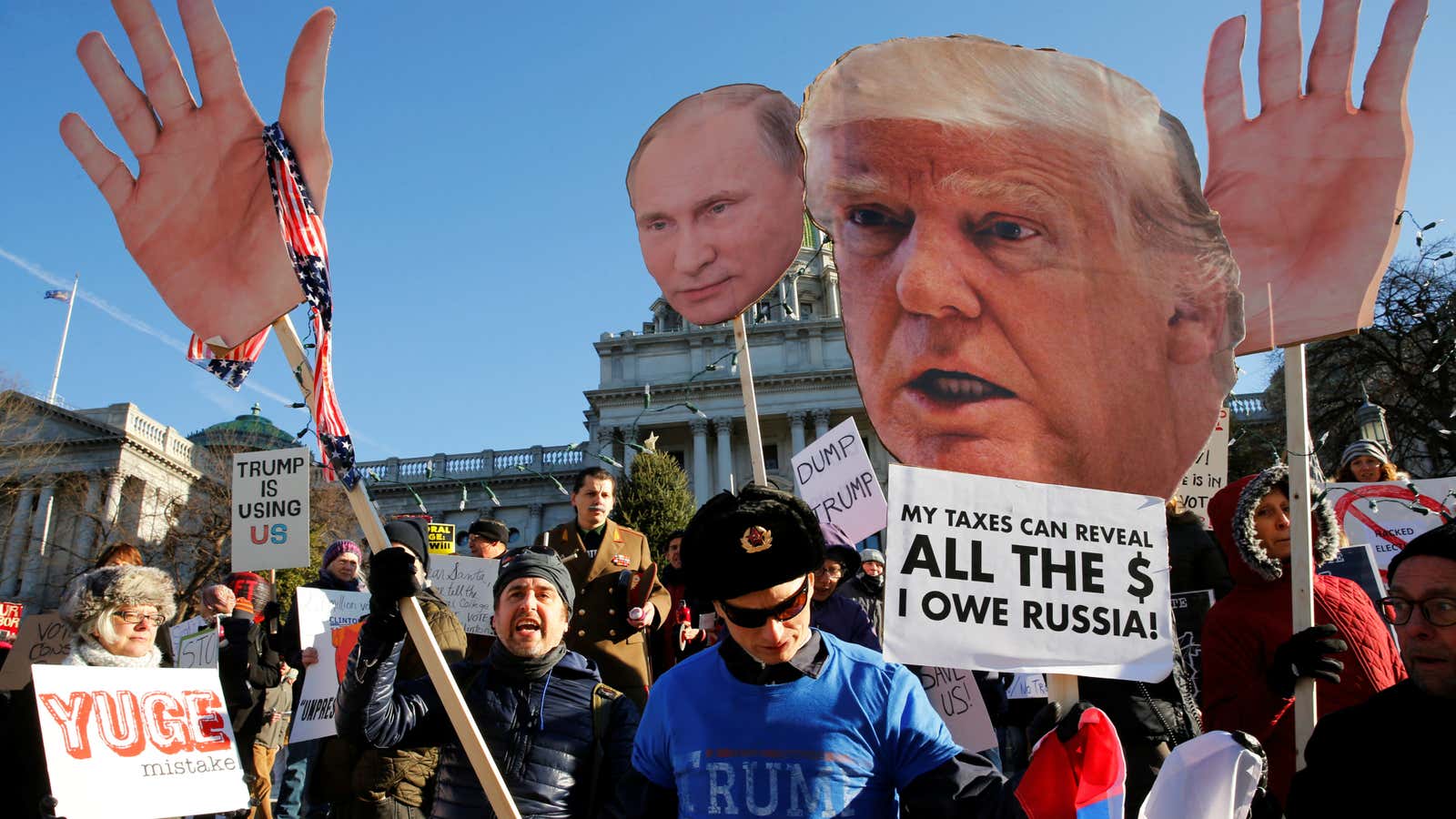The CIA’s assessment that the Russian government probably had a hand in the hacking the Democratic National Committee servers and the subsequent release of leaked emails written by members of the party sent shockwaves across Washington Dc. To Democrats, the alleged Russian cyberattack was a deliberate campaign against their presidential nominee; an unprecedented act of warfare by a nuclear-armed superpower. And to Republicans, the infringement is either a Kremlin-sponsored hack to “destroy democracy“ or a non-event that is being used to discredit the incoming president and his administration.
Whatever it is, the cyberattack is serious enough to warrant a studious, in-depth, and bipartisan congressional investigation in order to determine with the utmost certainty what exactly happened, which systems might have hacked, which files were leaked, why the intelligence community wasn’t able to block the hacking, and of course what the United States can do to prevent a similar act from happening again.
And yet, senate majority leader Mitch McConnell remains insistent that a special select committee is an unnecessary of investigating this matter. I have tried to come to some reasonable conclusion as to why McConnell is insisting that regular congressional committees can do the job, and I have failed.
Speaking to local Kentucky media, the majority leader said that the Senate Intelligence Committee led by chairman Richard Burr is “fully capable“ of conducting the inquiry—one that McConnell himself argued “is a matter of genuine concern and it needs to be investigated.”
The problem with following the regular order is that the Intelligence Committee, while certainly an appropriate venue to look into the matter, is the most secretive body in the entire Congress. The committee is built that way for reason of course; the intelligence community can’t conduct effective espionage, analysis, and counterterrorism without protecting sources and methods, which means congressional oversight on these activities needs to be kept classified. But the cyber intrusion has become such a political football in America’s discourse—the country’s major newspapers have been putting the cyberattack story on the front pages for weeks now—that studying this issue under the cloak of secrecy makes no sense.
Senate Democrats in the Intelligence Committee are also reportedly reluctant to push for a special committee due to concerns that doing so will ruin their relationship with Republicans on the panel. As Politico reports, “Democrats [on the committee] are also protecting their turf…because they already have access to intelligence briefings that other members are hoping to get access to as part of a broader special panel. To put it bluntly, Intelligence Committee Democrats appear more worried about turf wars and control over information flow than finding a way to investigate the hacks in the most efficient way possible.
Lawmakers need to ask themselves a simple but fundamental question: Is preserving the status quo more important than getting to the unadulterated, non-political truth?
Congress has created special committees and commissions on numerous occasions throughout its history. Think Watergate, the Church Committee, the Iran-Contra special committee, the joint congressional investigation on the 9/11 attacks, the 9/11 Commission, the WMD Commission, and the Financial Inquiry Commission. There is nothing unprecedented or unusual about the legislative branch setting up a committee with subpoena power and the authority to access as much relevant information as possible to study an issue that is either too complicated or time-consuming for an ordinary standing committee.
It is true that special committees have lately transformed into just another political tool to be used against one party or another. Depending on the lawmakers appointed to the committee, the entire ordeal can quickly turn into a partisan spitting match. As evidence, one need look no further than the special select committee on Benghazi, which House Republicans exploited as a political tool to dent Hillary Clinton’s presidential prospects during an election year. Democrats complained about being left out of meetings and accusing the Republicans who ran the operation as limiting access documents and witness testimony. Republicans, meanwhile, consistently charged Democrats with acting as Clinton’s lawyer throughout the proceedings. By the time the final report on Benghazi was released to the public, pretty much everyone involved was happy the investigation was over with.
McConnell may also be concerned that ordering a special look into Russian cyber-operations won’t be seen by the incoming Trump administration as an act of good faith. It has become abundantly obvious over the last month that president-elect Donald Trump wants this issue to go away and for Congress to spend its first few weeks repealing Obamacare and eliminating executive branch regulations.
None of those concerns, however, should outweigh the awesome power that Congress has at its disposal as an allegedly independent branch of government—not to mention the responsibility that the US Constitution invests in the legislative branch as the principal overseer of the entire federal government. State-sponsored infringement of America’s democracy is a charge serious enough to warrant a laser-focused look—and not a series of uncoordinated investigations spread out across several committees. To ensure that it doesn’t devolve into yet another political spat, the committee should be staffed and led by non-political experts with impeccable reputations among their colleagues within the national security community.
Senator McConnell and House speaker Paul Ryan are institutionalists at heart who care about Congress’s reputation and appreciate its history. But if both want to continue that tradition, they shouldn’t be afraid to exercise their Constitutional right to the whole truth.
